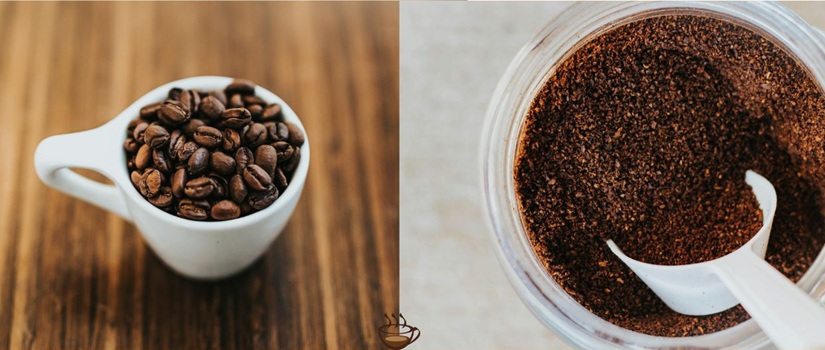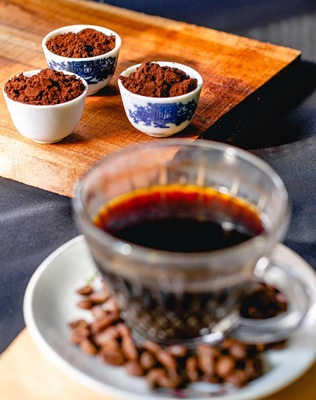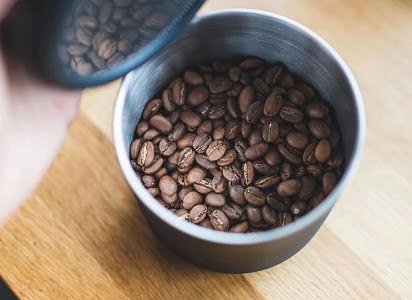Whole bean coffee offers maximum freshness, rich flavor, and full control over grind size. Ground coffee is convenient, quick to use, and more affordable, but it loses flavor faster. The best choice between whole bean vs ground coffee depends on your priorities, whether you want quality or convenience.

Choosing between whole bean and ground coffee can be confusing, especially if you’re new to brewing. Both have their pros and cons, and the correct choice depends on what matters most to you—flavor, freshness, convenience, or cost.
In this blog, I’ll break down the key differences to help you decide. You’ll learn why whole-bean coffee is often recommended, how pre-ground coffee offers convenience, and how each option affects taste, aroma, and shelf life.
Why do I recommend Whole Bean Coffee?
1. It’s Fresh
Freshness is where whole-bean coffee really shines. Coffee starts losing its flavor shortly after grinding. Whole beans, on the other hand, preserve their natural oils and volatile compounds until you grind them.
You’ll notice the difference immediately – that rich aroma hits you as soon as you grind the beans. Fresh coffee means better taste, and whole beans deliver that every single time.
2. You can choose your Brewing Method
Whole beans allow you to customize your grind size based on your preferred brewing method, whether it’s French press, espresso, pour-over, or drip.
- Coarse grind: Ideal for French press and Cold Brew
- Medium grind: Great for Drip coffee and Pour Overs
- Fine grind: Perfect for Espresso and Turkish Coffee
3. It gives you control over Brewing
You decide when to grind, how much to use, and how coarse or fine you want it. This control makes a huge difference in your final cup because you can adjust everything to get the exact strength and flavor you want.
If you grind beans too fine, it can result in over-extraction and bitterness, while too coarse can produce weak coffee. Having this control helps you fine-tune your brew to match your taste perfectly.
4. It’s the Best-Quality Coffee
Whole-bean coffee is often roasted with premium quality in mind. Brands know that customers buying whole beans usually care more about flavor and freshness, so they use better beans and roast them with greater attention.
There is a simple rule of thumb for coffee aficionados: grind within fifteen days of roasting and brew within fifteen minutes of grinding.

Some Benefits of Pre-Ground Coffee
1. Ease of Use
Pre-ground coffee saves you time and effort every morning. You just scoop it out and brew – no grinding, no measuring beans, no extra equipment to clean. This convenience really matters when you’re rushing to get ready for work or just want your coffee without the hassle.
2. Cost Effective
Pre-ground coffee typically costs less than whole beans. You’re also saving money by not needing a grinder, which can cost anywhere from $50 to several hundred dollars.
3. Consistent and Beginner-Friendly
You get the same grind size every time, which means consistent brewing results without any guesswork about grind settings. This removes the learning curve that comes with grinding your own beans. The manufacturer has already dialed in the grind size for general use, so you avoid those disappointing cups that happen when home grinding goes wrong.

The Difference in Flavor and Aroma of Whole Beans vs Ground Coffee
Whole beans offer the best flavor and aroma because they stay fresh longer. Whole beans lock in their oils, aromatics, and flavor compounds until you grind them, which means you get that intense, rich aroma the moment your grinder starts working.
Pre-ground coffee, on the other hand, loses much of its aroma soon after grinding. As it sits, the flavors fade, and the coffee can start to taste dull or flat. For the freshest cup, whole beans are always the better choice.
Difference in Shelf Life
Whole beans have a much longer shelf life than ground coffee. You can store whole beans in an airtight container for 2-4 weeks after roasting and still get great flavor, while ground coffee starts losing its punch within minutes of grinding.
The grinding process exposes way more surface area to air, moisture, and light – all the enemies of fresh coffee flavor. Ground coffee might technically be “good” for weeks, but you’ll notice the taste getting duller as time goes on.
Pro Tip: Always check the roast date on the bag, especially for whole beans. Fresh beans mean better coffee.
Grind Size Versatility and Customization
Whole beans give you complete control over grind size, which is huge for getting the perfect cup. You can grind coarse for French press, medium for drip coffee, fine for espresso, or anything in between to match your brewing method exactly. With pre-ground coffee, you usually get a medium grind only. That may work well for standard drip coffee makers, but doesn’t optimize for any specific brewing style.
When you control the grind, you control the extraction – finer grinds pull more flavor faster, while coarser grinds slow things down for longer brewing methods. This flexibility means you can experiment with different techniques and dial in your coffee exactly how you like it, rather than settling for a one-size-fits-all approach.
How to Store Coffee Properly?
Proper storage helps retain flavor, whether you use ground or whole beans.
Storage Tips:
- Keep both ground coffee and whole beans in a sealed container to protect them from air and moisture.
- Avoid sunlight, heat, and humidity. A pantry or cupboard works great.
- Avoid moisture, heat, and sunlight.
- Don’t keep coffee in the fridge (moisture and temperature changes degrade the flavors).
- Buy only for 2-4 weeks max, so you’re always working with fresh coffee

Pre-Ground vs. Whole Beans: What Should You Choose?
Whole beans are like a choose-your-own-adventure for coffee lovers — fresh, customizable, and full of flavor.
But hey, pre-ground has its perks too — quick, easy, and perfect when you’re racing the clock.
Want bold taste and full control? Go whole bean.
Need speed and simplicity? Pre-ground’s got your back.
At the end of the day, great coffee is whatever fits your vibe — just make sure it makes you smile with every sip.
FAQs
Is it healthier to grind your own coffee beans?
Grinding your own coffee doesn’t directly affect health, but it ensures fresher coffee, which means more antioxidants and natural oils are retained. These compounds degrade quickly in ground coffee.
Can you make coffee with whole beans?
Yes, you can make coffee with whole beans, but it’s not practical. You’d need to steep whole beans for hours to extract flavor, and the result is often weak. Grinding increases surface area, which is essential for proper extraction.
Do whole coffee beans weigh the same as ground coffee?
Yes, the weight stays the same before and after grinding; however, the volume changes. Ground coffee is denser and takes up less space.
Can I put whole beans in a coffee maker?
No, most coffee makers are designed for ground coffee. Using whole beans may damage the machine or result in a flavorless brew unless you’ve a grind and brew coffee maker.
Check out Related Guides



